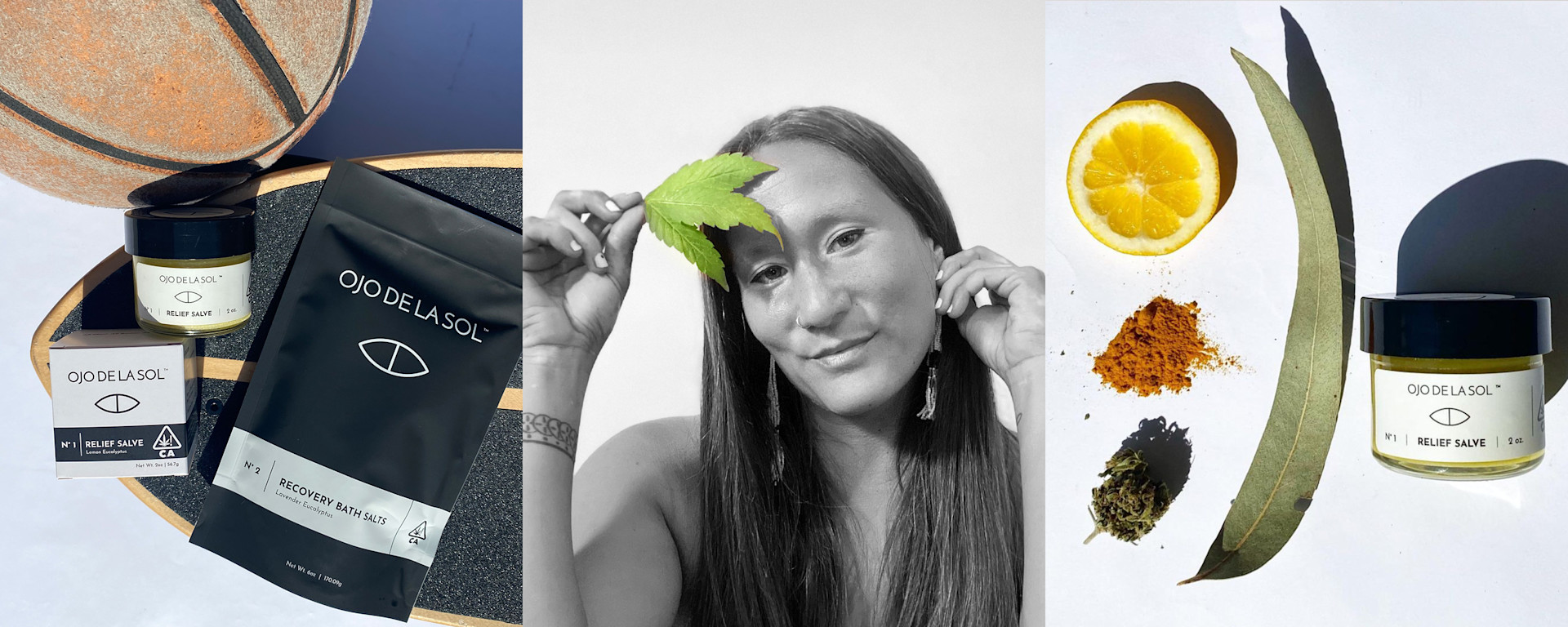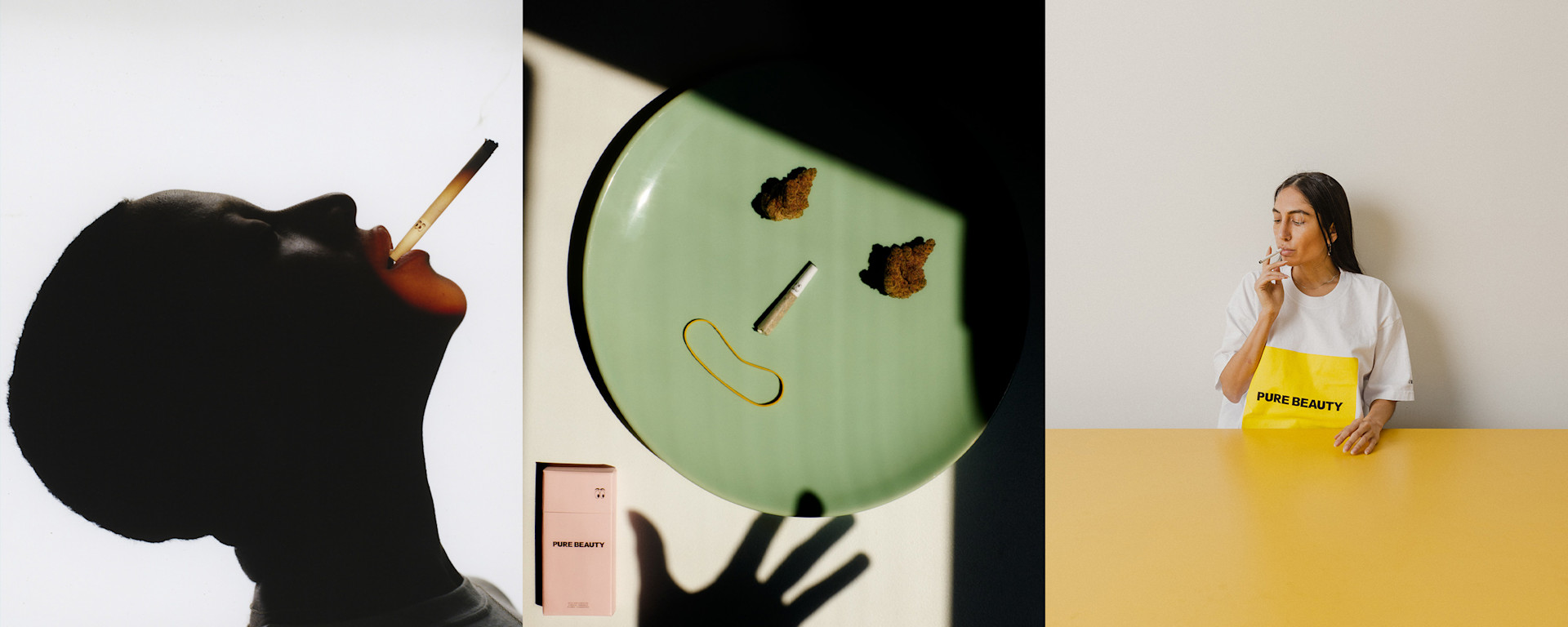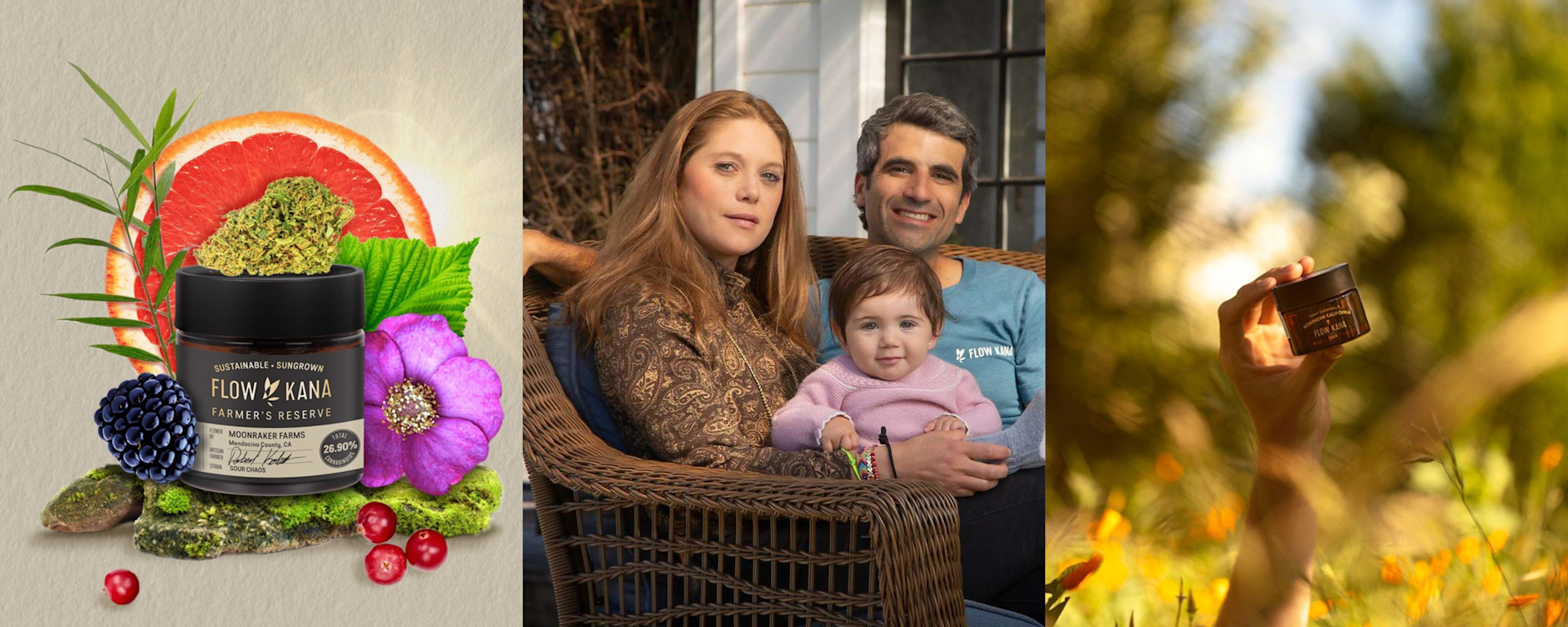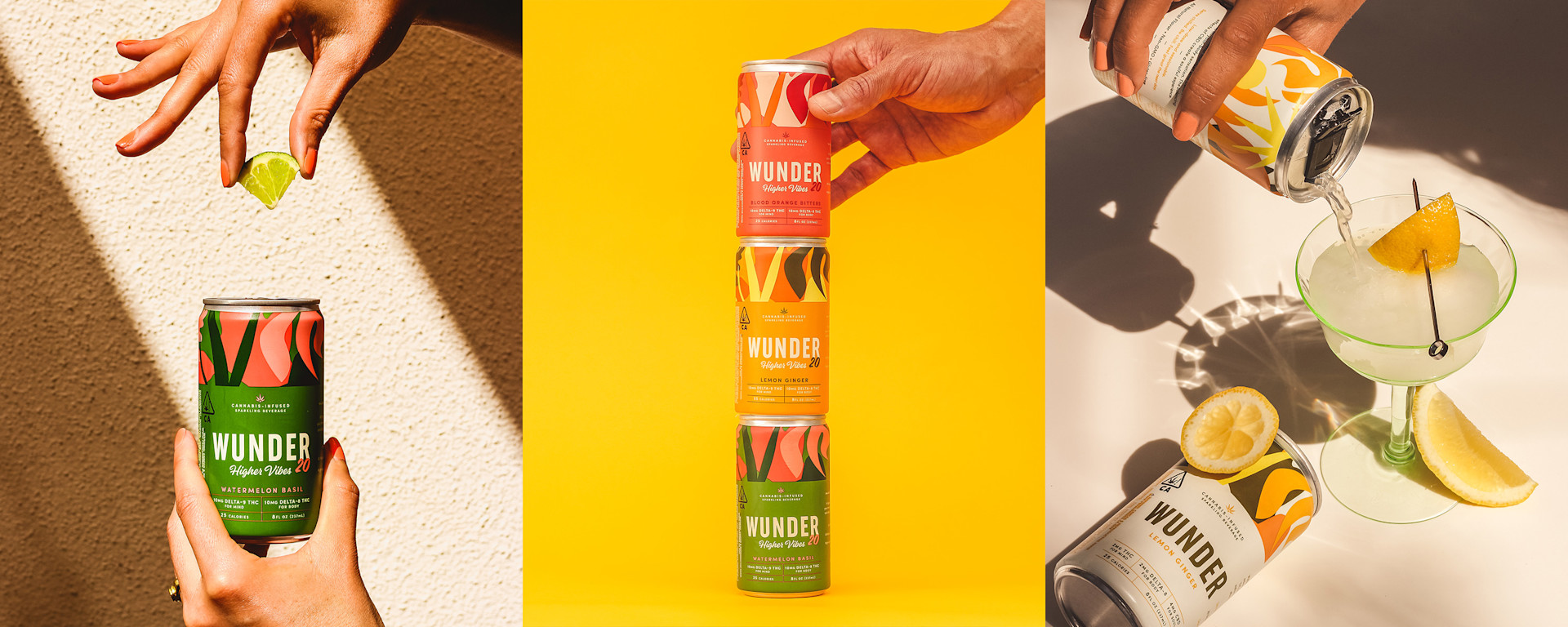Latinx Heritage Month

My mom grew up in San Juan, Puerto Rico, with the ocean nearby and the rainforest in the distance. She moved to Boston in the 70s for college, met my dad, had me, and stayed. As a child of the 60s and a chronic migraine sufferer, she has been a cannabis user her whole life - for medicine and pleasure. Growing up she was always open and honest with me, but hid her consumption from the outside world where it was still taboo. Despite this, her circle of friends would consume cannabis together recreationally, and she bought weed from another mom whose house we would go to for dinner every time she made a purchase (so as not to be seen coming and going from the house too quickly). She was part of a tight-knit community of Latina women who saw the taboo as ridiculous, surrounded by a city known for its bars and drinking culture. This introduction to cannabis shaped my perceptions and lack of taboo around the plant.
When I moved to California and started to work in the industry, I didn’t see as many Latinx folks as I would have hoped for or had seen in my pre-cannabis career on the East Coast. As in all industries, representation matters, and my hope is that seeing Latinx brands will inspire others to get involved.
I’m thrilled that Sava is able to offer products from four Latinx-owned brands: Ojo De La Sol, Pure Beauty, Wunder, and Flow Kana. To celebrate Latinx Heritage Month, we sat down with the founders of our Latinx-owned brands for a conversation about the relationship between Latinx culture and cannabis.
Cheers,
Amanda, Sava Co-Founder + CMO

OJO DE LA SOL
Ojo De La Sol exists within an ecosystem of the cannabis industry that promotes solidarity and reciprocity to dismantle the systems that uphold extractive economies, extractive farming practices, and extractive relationships often at the exclusion of Black, Brown, and Indigenous people. Ojo De La Sol’s products are sourced with intention and care by their CEO and Medicine Maker Dania Cabello, each item carefully considered for its impact on humans and the planet.
Sava: How would you describe the relationship between Latinx culture and cannabis?
Dania: Let me begin by saying I'm proud that I make medicine that works - that helps people with chronic pain, that eases some of life's physical discomforts. I'm also proud and equally grateful that I've been able to enter one of the most regulated and expensive industries in the country not because of financial backing, but because I have developed and nurtured relationships of solidarity and reciprocity with people who understand the importance and significance of resource and access redistribution.
Immigrants, refugees like my parents in particular, are resourceful and ingenious. And one of the key components to their success that has undoubtedly enabled mine was the centering of relationships between people and our relationship towards the earth. I share this to say my cultural inheritance is much deeper and more significant than traditional capitalist business culture. My culture is alive and life-affirming. And it is this culture that has allowed me to enter and defy odds in an industry that wasn't designed to welcome and support me, let alone people targeted by the war on drugs with less access to social capital than I've had. So again, I'm proud to be in this position and grateful to each person who has helped make this possible.
Sava: Are any of your products inspired by your heritage?
Dania: All of my products are inspired by my heritage...but to expand on that I must complicate what it means to be considered Latinx and how my heritage influences my medicine. I am Chilena, daughter of political refugees who were forced to flee their homeland and arrived at a city called Oakland in 1976. I am a daughter of a dictatorship born in exile. Like many Chilenas, I am a descendant of European colonizers and Indigenous people, Mapuche. People of the earth. Much of my life and education in schools centered white, violent, patriarchal histories. The knowledge of the atrocities inflicted upon both my ancestors and my own parents and sisters is what sent me on the journey I'm on to recenter my indigenous heritage and reclaim our medicine making practices. As a student of Mapuche medicine I turned to herbs to assist in my own and in my and in my family's healing. All of the medicine I make, while inspired by a plant that has "become native" to California, has its base in traditional Mapuche medicine-making practices. I use whole plants. I pray over the medicine. There are colors and metals we wear when we're in the kitchen to dispel negative energy and to keep our spirits connected to source. So, yes, my products are deeply inspired by my heritage.
Sava: How did you get into the cannabis industry?
Dania: My relationship with cannabis wasn't and isn't always spiritual. I grew up smoking weed from a young age, not heavily as I was concerned with how it might impact my sports career, yet it continued to evolve after I stopped playing professional soccer. I like getting high, but there was a time I noticed that smoking weed was negatively impacting my mental health. In my mid-twenties I had my first bout with what western physicians refer to as bipolar depression...I understand it more as a deep connection gone in the wrong direction. It was during this time that I turned inward, into myself and my family. Forced exile has had a deep psychological impact not only for members of my family born in Chile, but those of us born here too. The more I wrestled with the violent rupture of a homeland that I only knew through stories the deeper the stories of land displacement and spiritual disconnection became. Learning these stories was one of the first acts of healing on my journey and I'm still learning. Psychological trauma lives in our bodies and thus the body became the vehicle that I centered to begin to address mine and my family's psychological scars. Cannabis has been my teacher, a plant I use to remember health in mind, body, and spirit as reflected in the topical medicine I make for the movement.
Sava: Any organizations in the cannabis industry that you’d like to shout out?
Dania: I'd like to shout out the organizations and people in the cannabis industry who have directly supported my work and enabled me to be here and to continue to grow–Supernova Women, Nina Parks from Gift of Doja, el Padrino Ramon Garcia, the whole team at Locals Equity Distro, Albert DaCunha of Dovana Caramels, Chaos of Farmaceuticals Co., Susanna of Sweet Releaf, ALL the Ojo De La Sol users who made my medicine "a thing," and of course my whole familia.
Try our favorite Ojo de la Sol products:

PURE BEAUTY
Led by CEO Imelda Walavalkar, Pure Beauty is an environmentally progressive boutique cannabis brand whose high quality flower is grown indoors in one of the most eco-sustainable cultivations in the country. All water used to grow Pure Beauty’s plants is captured from the air using dehumidification, saving millions of gallons of water a year. Committed to criminal justice reform, a portion of all Pure Beauty’s profits are donated to Defy Ventures, a not-for-profit providing multi-disciplinary support and training to incarcerated populations with the goal of reducing rates of recidivism.
Sava: What’s your experience been like as a Latina woman in the cannabis industry?
Imelda: ??I enjoy being a Mexican woman in the cannabis industry, I just wish there were more of us. When you look at the mastheads of any of the biggest cannabis companies, it is rare to see any Latinx people. We as an industry need to make more tangible efforts to support Latinx businesses as well as Latinx people in leadership positions. The fact that it is so expensive to not just enter the legal cannabis market but exist as a cannabis business makes it even harder for us; this is compounded by our disproportionately low access to capital--less than 2% of venture capital funding goes to Latinx entrepreneurs (the number is even lower for Latinx women).
Growing up Brown/Mexican/Asian in a conservative, predominantly white community, I felt very marginalized because of my skin and culture(s). But now I am so grateful for having this life experience because I truly believe that adversity makes you a stronger, more interesting person—forces you to understand different perspectives, empathize, and be more connected to our universal humanity. I think these are extremely important qualities to have in business, particularly a business that is, ultimately, all about connection and understanding the world in new ways.
Sava: Are any of your products inspired by your heritage?
Imelda: Yes, I think because I have a wide range of inspiration to draw from aside from what is mainstream—Mexican/Chicanx culture is very rich from music to food to even just how we exist in the broader context of America (which is intrinsically political). And this very much informs everything we do with Pure Beauty. In a lot of ways we are a very Mexican/Chicanx brand—American, but through the lens of a Brown person, lol.
Sava: How did you get into the cannabis industry?
Imelda: The first chapter of my career was in social justice. It is what I studied and then worked with various non-profits around NYC and the country—specifically with post-incarcerated and other “at-risk populations.” I did that for a number of years and then got jaded by my ability to do anything too impactful in light of the forces of unfettered capitalism and institutional racism. So then I started a catering business because I love food.
Cannabis was a natural progression of all the things I care about from just actually loving the plant and the profound experience of being high to social justice to making things and building a business. Even prior to Pure Beauty, I have always been a very passionate consumer. The motivation behind my consumption has always been pretty deep; simply put, it gives me a necessary and lasting perspective shift. It helps me realize all the things I worry about all the time do not, ultimately, matter. And that I am lucky to just be alive and enjoying this beautiful plant!
Sava: What qualities are at the heart of Pure Beauty?
Imelda: Pure Beauty was created as a reaction to what we felt didn’t exist. There was not anything in the market addressing culture and creativity the way we saw it. Pure Beauty was designed to celebrate the things about creativity that touch on all different sectors of culture like art, fashion, photography, music and filmmaking; and also just humor and laughter. All of these things, of course, have such a strong connection to weed. On top of that we also care a lot about what we are doing, how we are doing it and the impact we are having, so sustainability and social justice are inherent to everything we do. But we have also tried to be very careful not to shout too loudly about this because we understand that we are not perfect and there are always things we could be doing better.
Try our favorite Pure Beauty products:

FLOW KANA
Flow Kana established the first network of licensed, independent cannabis cultivators, and quickly became the best-selling sungrown craft cannabis flower brand in California. Led by Michael Steinmetz and Flavia Cassani, they connect consumers with the Emerald Triangle’s legacy cultivators and unique genetics in the form of premium, sustainable, sun grown cannabis flower- to enhance their lives and help achieve flow state.
Sava: How has being Latinx informed your experience in the cannabis industry?
Michael and Flavia: As Latinos, my husband and I have always tried to hire other Latinos since the day we started. Most employees end up saying that working for Flow Cannabis Co. will at least teach you some Spanish. ?
Coming from LATAM (Latin America) has definitely served us well to be able to navigate such a changing and young industry. Latino immigrants have a different tolerance to risk, to changes, to recessions than do many native-born Americans, which I think makes us more resilient and able to endure and persevere.
Also, the cannabis industry is a very relationship-, networking-, and interaction-based industry. All of those characteristics are very ingrained in our cultures and tend to come out naturally.
Sava: Are any of your products inspired by your heritage?
Michael and Flavia: I don’t think our products are inspired by our Latino heritage, but rather, are more Emerald Triangle heritage-focused. Perhaps the names of our brands do have a meaning in the underground cannabis culture of Venezuela. For example, we would always use the word ‘Flow’ when we were having a good high, or the word ‘Roots’ to identify a group of people who liked cannabis, and both of those words now define our products.
Sava: How did Flow Kana get its start?
Michael and Flavia: Flow Kana is rooted in the rich legacy and culture of the Emerald Triangle and surrounding regions. When my husband Michael Steimetz and I first toured this amazing area, we knew that we had to be a part of it and help to celebrate it and support the farmers who make it happen. The pioneers of the California cannabis industry found this tri-county area of Mendocino, Humboldt, and Trinity counties to be a restorative environment with the ideal terroir to cultivate world-renowned, sustainably produced, premium, sungrown cannabis. We set out to build the largest supply chain possible for them to allow this best-in-class cannabis to be sold legally throughout California, so that the farmers could prosper and customers could have access to the best flower found anywhere in the world.
Sava: Any social equity advocacy organizations that you'd like to shout out?
Michael and Flavia: Last Prisoner Project, a team of cannabis industry leaders, social justice advocates, and leaders in drug policy reform who are committed to freeing every last prisoner of the unjust war on drugs.
Try our favorite Flow Kana products:

WUNDER
Wunder's mission is to bring wonder to the world through a more mindful alternative to alcohol. Led by CEO Alexi Chialtas, Wunder beverages can be felt in as few as fifteen minutes, due to their micro-emulsified cannabis extract which absorbs quickly into the bloodstream through the membrane in the mouth.
Sava: What’s your experience been like being Latinx in the cannabis industry?
Alexi: I've spent a good chunk of my early years in cannabis internally focused as we pushed to get to market. I've appreciated that the cannabis industry is one of the most inclusive industries out there and it's set a high standard for how WUNDER seeks to act as a member of the community. Knowing that the cannabis industry had such a strong swell of momentum to support under presented ethnicities was inspiring.
Sava: Are any of your products inspired by your heritage?
Alexi: My mom was born in Paraguay, and growing up in Los Angeles there were many different flavors of Latinx influence. In the early days of WUNDER, one of my sources of inspiration in thinking through flavors was Agua Fresca. I like to feel that our Watermelon Basil is a nod towards the always delicious Sandia Agua Fresca.
Sava: How did you get into the cannabis industry?
Alexi: I was first exposed to cannabis through smoking spliffs with European dormmates at Berkeley. It was a social ritual that was a core part of many conversations at such a young age—whether during a meal or after a fun night out. After I graduated I found myself working very long hours and cannabis was one of those things that faded away. I spent nearly 7 years at Zynga where our mission was to connect the world through games. As the company was experiencing crazy hypergrowth (300 to 3,000 in 3 years) I saw firsthand how alcohol had a monopoly on social and celebration. These were part of the early seeds for what would inspire me to get excited about changing the way people think about alcohol alternatives with cannabis beverages.
Sava: Any favorite memories at the company?
Alexi: Some of my fondest moments are from early 2019 when we brought different friend groups together for WUNDER Hour. After these electric nights where people mingled at house gatherings in a similar way they would with alcohol, we knew cannabis beverages would pave the way for alcohol alternatives.
Sava: Any Latinx social equity advocacy organizations that you'd like to shout out?
Alexi: With three kids in San Francisco, education is always top of mind. My four-year-old just started at Potrero Kids—which is a Spanish-first pre-school that focuses on building community in the Potrero, Dog Patch and Mission neighborhoods in San Francisco. I really appreciate what they do to make sure that education is accessible for people of all socio economic backgrounds in San Francisco.
Try our favorite Wunder products:

 First, create your Sava account.
First, create your Sava account. Your $40 discount will apply automatically on your first order.
Your $40 discount will apply automatically on your first order.